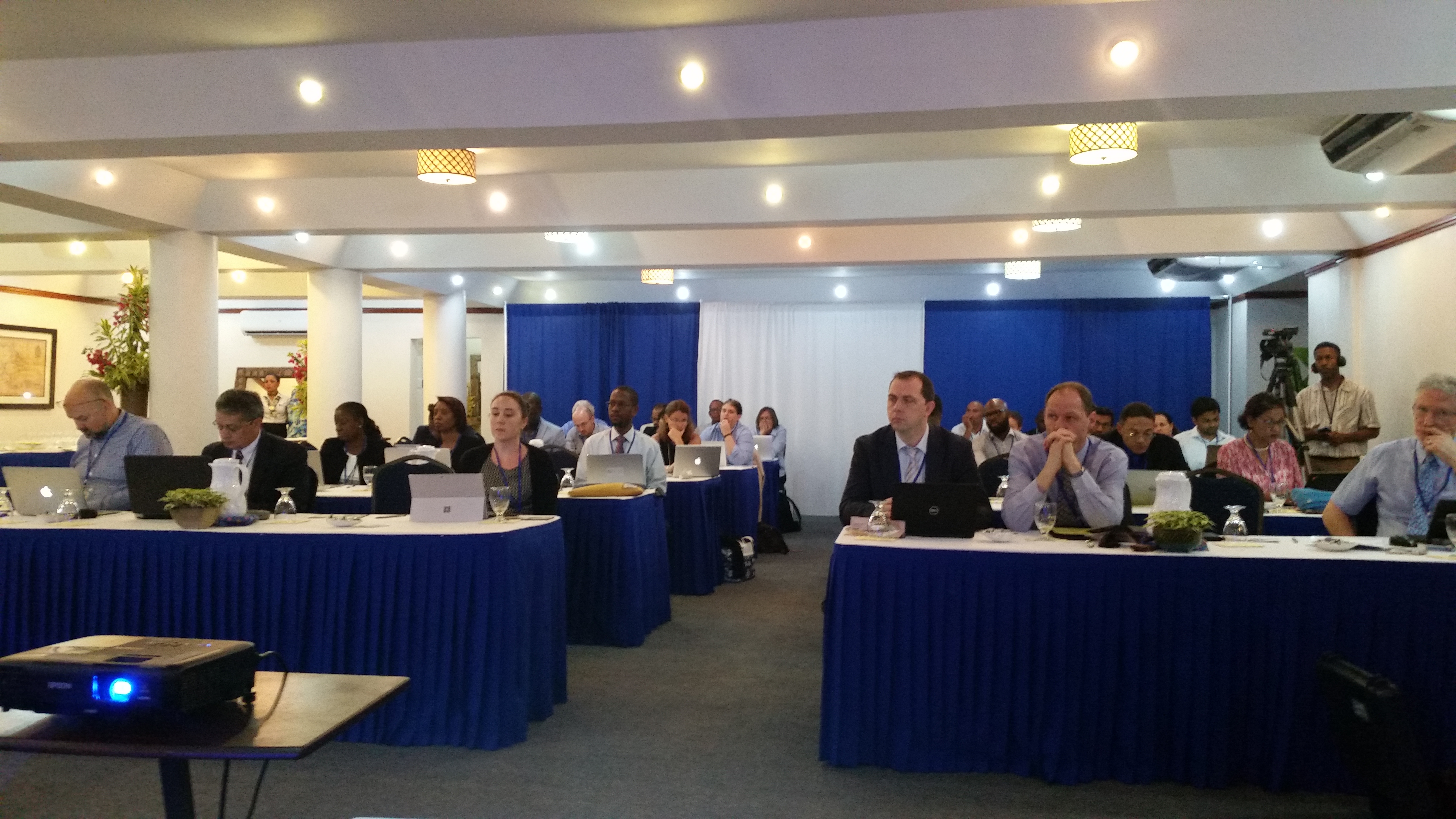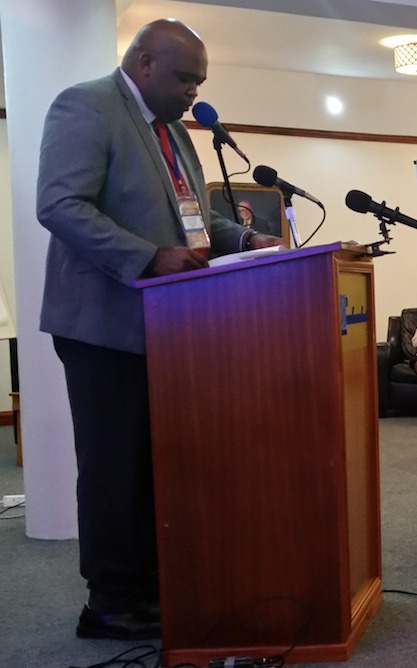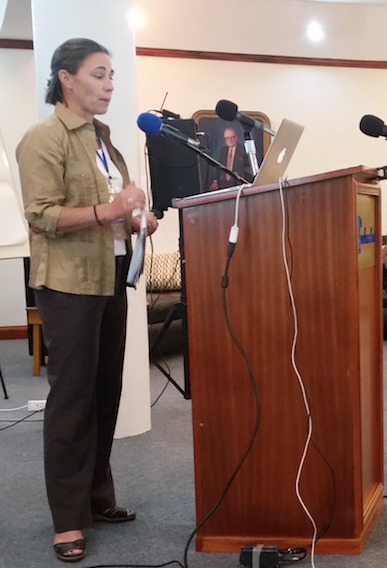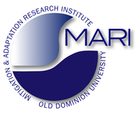Implementing and Monitoring the Sustainable Development Goals in the Caribbean: The Role of the Ocean
Opening Session
Co-Chairs: Dr. Hans-Peter Plag, Danielle Evanson
The opening session set the stage for the workshop. After welcome notes from the government of Saint Vincent and the Grenadines delivered by the Hon. Saboto Caesar, Minister of Agriculture, Forestry, Fisheries, Rural Transformation, Industry and Labour, Government of Saint Vincent and the Grenadines, and the Group on Earth Observations (GEO) communicated by Dr. Douglas Cripe, the Session featured a number of keynotes providing insight into the interface between science and governance in the Caribbean Small Island Developing States (SIDS) and the particular challenges faced by the SIDS. A keynote reflected on the implementation of the Blue Economy, which seeks to establish a sustainable use of marine resources as a component to the economies of the SIDS. Adopting a Blue Economy was seen as aligned with targets of the 2030 Agenda for Sustainable Development. The final keynote discussed the contribution of Earth Observations to the implementation and monitoring of the SDGs.
 |
The workshop brought together 42 participants from sixteen countries representing a wide range of stakeholders. The workshop benefited from having a very diverse audience comprised of many different organizations, private, public, and governmental and from not being overwhelmed by one type of representative. |
Opening the workshop, Hon. Minister Caesar noted that the workshop was about solving problems that many in the SIDS had nothing to do with. He emphasized that there was often a disconnect between the theory and implementation, so we need to come up with relevant solutions, grounded in practical actions. A way to do this is to implement SDGs in a small space, a “geospace for SDGs” where practices can be developed to bring the SDGs to the people and to prove that the implementation can be done over a large space. He stated that in Saint Vincent and the Grenadines such a geospace will be implemented in a joint state-based and grass-roots effort.
In the welcoming note from GEO, Dr. Douglas Cripe, GEO Secretariat informed the participants that GEO now has a mandate from the United Nations to supply Earth observations for the SDG monitoring process. In his considerations on the challenges and opportunities concerning the implementation of the 2030 Agenda in the Caribbean SIDS, Mr. Chad Blackman, Trade International, asked the question of what leadership and guidance for SDGs is provided by policy makers and recommended that the lessons learned from the Millennium Development Goal process should be taken into account. He considered the core question of what are some of the major hindrances that can interfere with sustainable growth in the Caribbean and what does compliance with the 2030 Agenda mean for the average person. He saw an urgent need for capacity building of community builders and leaders to enable them to bring the process to the local level. At that level, it is important to see the private sector, NGOs, and government through the lens of SDGs. He went on to make the point that the Caribbean is a special case because of the significant impacts by climate change already now affecting major sectors (such as agriculture and tourism). Funding is required to address these impacts and also to provide healthcare for new emerging disease. The role of the ocean for the SDGs particularly in the SIDS was well recognized and regionally accepted plans for utilizing resources are in place. Mr Blackman emphasized the need to ensure the sustainability of the SDG implementation, which requires mindfulness of business on potential impacts on communities. He saw the need for SDG champions for the Caribbean and recommended to create a regional SDG implementation index for that monitors where the countries are at and suggested that the Caribbean is developed as a SDG success story to be replicated elsewhere. He concluded that this cannot be business as usual and that future generations will judge the present one harshly if we fail to act.
 Mr Chad Blackman, Trade International, Barbados saw the need for SDG champions for the Caribbean and recommended the development of a regional SDG implementation index. |
 Dr Claire Morrall, St. George's University, Grenada, pointed out that scientists often have limited understanding of the societal decision and policy making processes, which hampers the scientific knowledge transfer into these processes. |
Discussing the interface between science and policy making, Dr. Claire Morrall, St. George's University, Grenada, emphasized the importance of the ocean area, which is much larger than the land space for Caribbean SIDS. There are some links between academics, governments, statutory bodies, NGOs, and regional and international agencies, but much of the science advice is provided by “parachute scientists” brought in on a case-by-case basis. She saw the need for increased partnering with local scientists. Scientists often have limited understanding of the policy process, and knowledge transfer between science and policy making is currently not as valued in society as science and research by themselves are. She also saw a challenge in a distrust of science and a rejection of science that has some level of “inconvenience”. Dr Morrall used a number of examples from the Grenadines network of marine protected areas to illustrate her points.
Dr. Irena Zubcevic, UN-DESA introduced the concept of Blue economy, which promotes “economic growth, social inclusion, and preservation or improvement of livelihoods while at the same time ensuring environmental sustainability of oceans and coastal areas.” The goal is a decoupling of socioeconomic development through oceans-related sectors and activities from environmental and ecosystems degradation. The blue economy comprises “diverse components, including established traditional ocean industries such as fisheries, tourism and maritime transport, but also new and emerging activities, such as offshore renewable energy, aquaculture, seabed extractive activities, and marine biotechnology and bioprospecting.” She emphasized that the ocean and the related resources are a fundamental base upon which economies and culture of many SIDS and coastal Low-Income Developing Countries (LDCs) are built. The ocean is also central to them implementing the SDGs. She explained that a blue economy can “provide SIDS and coastal LDCs with basis to pursue a low-carbon and resource-efficient path to economic growth and development designed to enhance livelihoods for the poor, create employment opportunities, and reduce poverty.” However, SIDS and coastal LDCs often lack capacity, skills and financial support to better develop their blue economy. In view of these challenges for the SIDS and coastal LDCs, partnerships can be looked at as a way to enhance capacity building.
Giving an overview of the work the GEO EO4SDGs Initiative, Dr. Argie Kavvada displayed the efforts made at country level to utilize Earth observations for the quantification of the SDG indicators. Examples illustrated the need to combine traditional Earth observations with socio-economic data. She also presented efforts in capacity building through web-based seminars and training programs. She concluded that the “integration of statistics with geospatial information and Earth observations is necessary to enable informed decision-making and an integrated approach to support the development of informed policies and national leadership. Participation of all stakeholders, including civil society and the private sector, is essential to ensure access to reliable, unbiased, accurate, timely, accessible and disaggregated information to ensure that no one is left behind. The sharing of knowledge, experiences, and lessons learned across countries is vital to help scale successful methods, share best practices and respond to the 2030 Agenda.”
This workshop was sponsored by:
 under grant 80NSSC17K0241 |
 |
 |
 |
 |